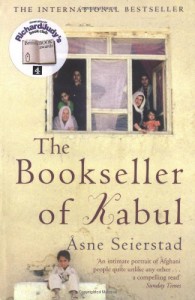 This book is nothing what I thought it would be. I read the flap and assumed it was going to be the author's recollection of her experience with the Khan family while she found solace in their house. Instead, Åsne Seierstad writes entirely as a third person, excluding herself from the story of what typical life is like in Afghanistan. I was hardly disappointed in the writing style, but I constantly questioned whether this was true events or something the author embellished to give the story the right kind of feel so that the reader can really feel immersed in the culture.
This book is nothing what I thought it would be. I read the flap and assumed it was going to be the author's recollection of her experience with the Khan family while she found solace in their house. Instead, Åsne Seierstad writes entirely as a third person, excluding herself from the story of what typical life is like in Afghanistan. I was hardly disappointed in the writing style, but I constantly questioned whether this was true events or something the author embellished to give the story the right kind of feel so that the reader can really feel immersed in the culture.Seierstad is able to write about what people are thinking and feeling, events that happen outside of the house and in the privacy of others' homes. At times I think it might have been best to market the book as a work of fiction, but knowing a foreigner could sit in the home and be a witness still captivated me.
What ever the case may be, I learned so much about men and women in Afghanistan and have to wonder if the men feel just as oppressed at times. I know that the book has an easy target in women, describing the hard lives they lead and how unfair and unfortunate they can be. But choosing Sultan Khan to be the protagonist in the book tells me that it's the men too, who feel like politics and religion don't give them a fair shake either, but they accept their fate and carry on.
After finishing, I think this would have been just another memoir of accounts that one went through as a billet in a foreign home, but since the author cleverly masked the book as a factual book of fiction about the Khan family, I was able to forget the thoughts and opinions were the author's and truly believe she captured the real feelings from the family themselves.


